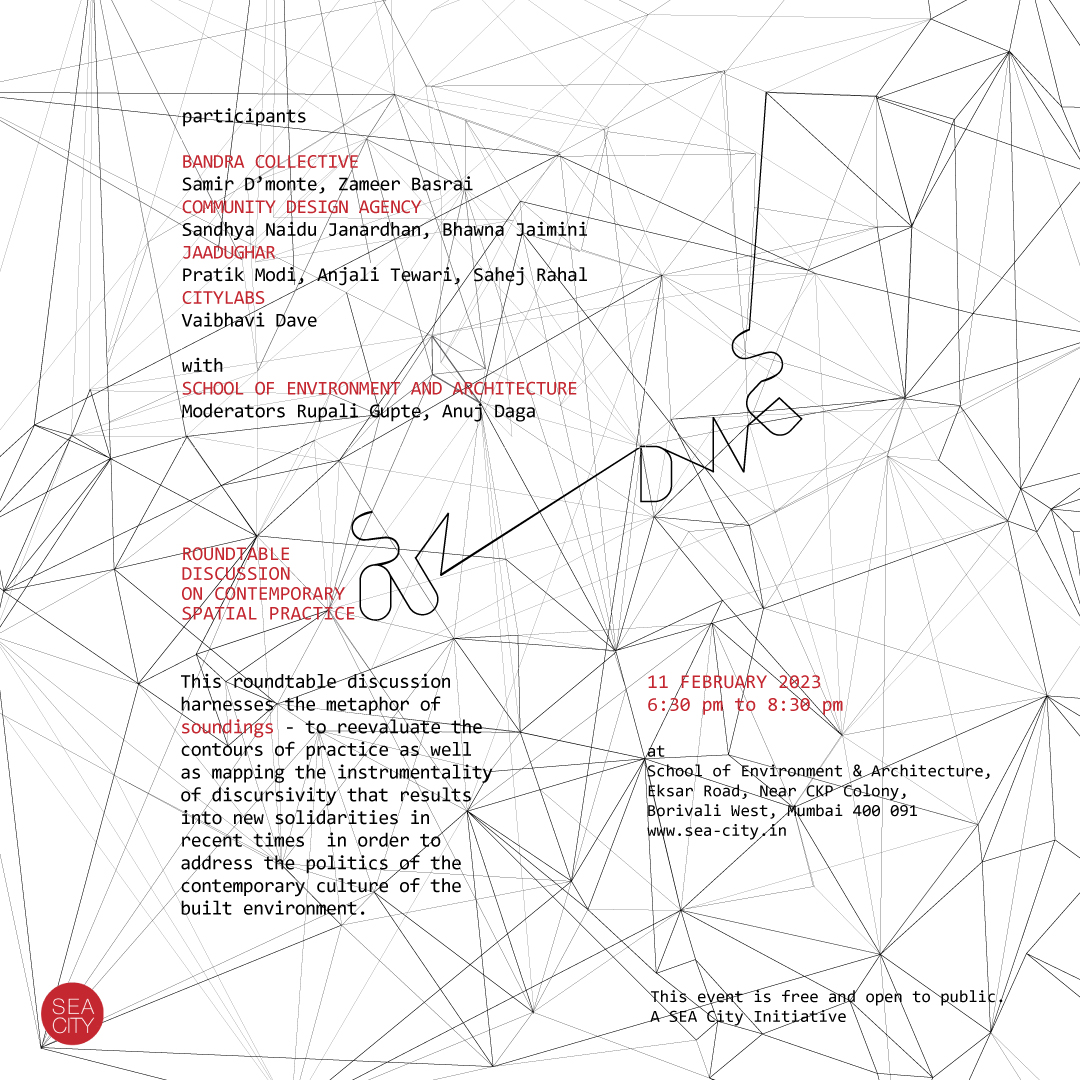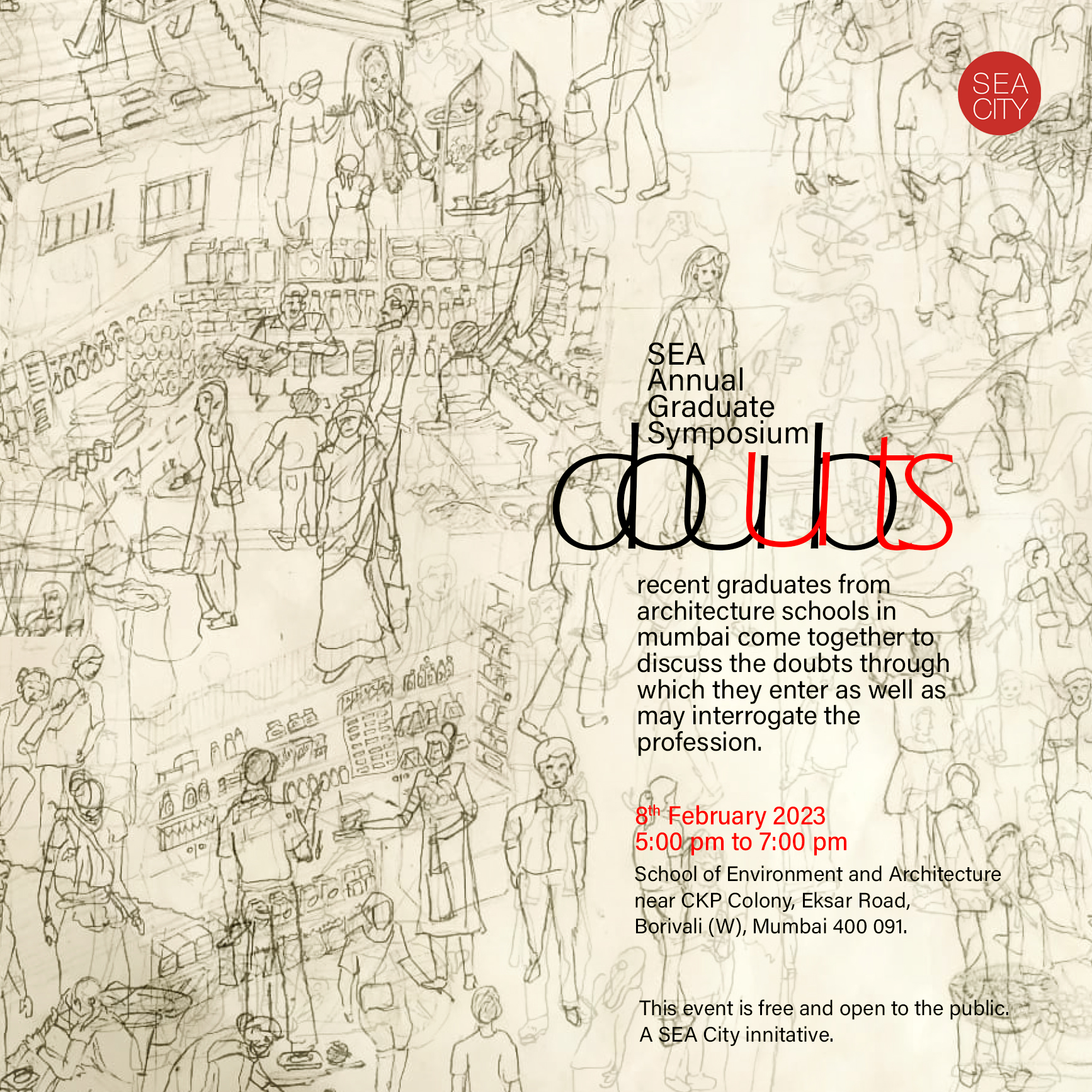Architects’ Roundtable 2022-23


Architects’ Roundtable
SOUNDINGS
11th February 20236:30 pm to 8:30 pm
Participants
Bandra Collective / Samir D’monte, Zameer Basrai Community Design Agency / Sandhya Naidu Janardhan, Bhawna Jaimini
Jaadughar / Pratik Modi, Anjali Tewari, Sahej Rahal CityLabs / Vaibhavi Dave
moderated by School of Environment and Architecture (Rupali Gupte, Anuj Daga)
Sounding is a process of using sound waves to measure the undulating depths of ocean beds so that heavy ships can navigate waters safely. Sounding lines created by ships over multiple routes effectively map the terrain hidden beneath the constantly changing surface of the sea. Ancient mariners used sounding-weights, the oldest known marine navigational instrument, not only to determine the depth of water, but also to bring up samples of the bottom, comparing the result with their knowledge of coastal geography and river behavior. Although charts were rudimentary by modern standards, Greek and Roman navigators had a surprisingly effective knowledge of the seas. Much like these navigators of the sea, American artist-architect and educator John Hejduk uses the concept of ‘Soundings’ to string together fragments of imaginations in the form of drawings, texts or poems, to lay out the speculative fundamentals of his discipline as well as suggest propositional dimensions for architectural practice.
Several urgent questions that may be buried under the waters of institutional debris have attracted interrogation and reorientation in recent times. Contemporary architectural and artistic spheres have been undergoing a steady disintegration of traditional models of practice. The emerging complexities in urban conditions, the changing political economies of practice, the new dynamics of caste and class, the debates around spatial justice have necessitated new formations outside the atelier or corporate models. While standard forms of practice are built around economic impetus, what sustains solidarities that are oriented through spatial concerns? What potential do such organizational formations have towards redefining the ethics and politics of spatial practice? What challenges do they work with and what futures do they promise?
Soundings aims to investigate the impulses that drive spatial practitioners to reorganize themselves into new collectives and collaborations in order to address the politics of the contemporary culture of the built environment. Within the larger rubric of SEA’s annual conference ‘Noise-fields’, this roundtable discussion harnesses the metaphor of soundings - to reevaluate the contours of practice as well as mapping the instrumentality of discursivity that results into new solidarities - in turn excavating a new ground over which spatial practice may sprout. Soundings then, is a way of finding new ways to swim through the waters of architecture as a socio-political and cultural practice. It offers a framework within which the unseen may be sensed and sailed.
Graduate Symposium
DOUBTS
8th February, 2023,5:00 to 7:00 pm
“In doubting, you create provisions for many people to participate.”
Provisions (2019), Raqs Media Collective
A generation after the economic liberalization since the 1990s, the architectural profession in India looms in a starkly polarised built environment. On the one hand, architects offer service to the elite patrons, and more recently, the practice has remained concerned with spatio-social disparities of class, caste, gender in the built environment. A graduating professional of architecture is often expected to choose a clear path between the above two: either one tries to quickly “fit into” a category of practicing architecture defined principally by the market – as a commercial, residential, sustainable, high rise etc. expert, or left to “figure out” a form of practice that may demand interrogation of these very established roles in order to base a relevant and revised ethics of working within the contemporary.
In the process of maintaining vocational expertise, the young architect is susceptible to lose one’s sense of intellectual agency – an ability and will to locate within the politics of contemporary practice. The expectation to perform this expertise in the field often pushes young graduates to imagine their roles as mere service providers to (more often than not,) an elite clientele who dictates the market by virtue of money. While laden with uncertainties, many succumb to the competitive forces of the capital driven market rather than figuring meaningful methods of addressing contemporary spatial concerns.
‘Doubts’ is an invitation to young graduates of architecture to channel their contemplative inner voice in an emphatic manner towards articulating a relevant mode of practice in the contemporary times. This symposium aims to bring recent graduates of architecture together to share not only their doubts around practice having stepped outside the safe space of the institution, but also to unpack what could be made uncertain about the seemingly settled architectural profession? What are the ways in which we may destabilize established ways of spatial practice that reproduce hierarchies of social inequity, caste, gender or even aesthetic hegemonies of form that are closely linked to spatial access? How does one create a mode and means of relevant practice in architecture?
A doubting profession could be more agile and tolerant that could offer innovative directions of occupying and inhabiting the world. To doubt is to resist norms while still being engaged with the social order. To doubt is to look out for what’s next, to doubt is to thus remain alert and open for the new. In doubting, we expand a community of thinking individuals. In ambiguity lies the possibility of an alternative future, a way of being relevant and contemporary.